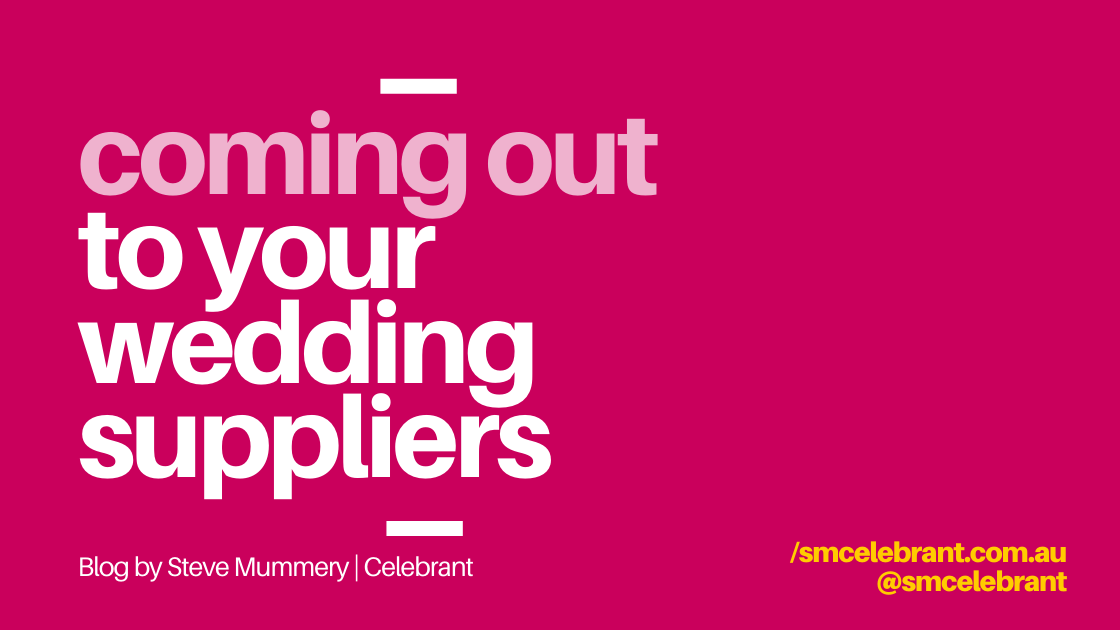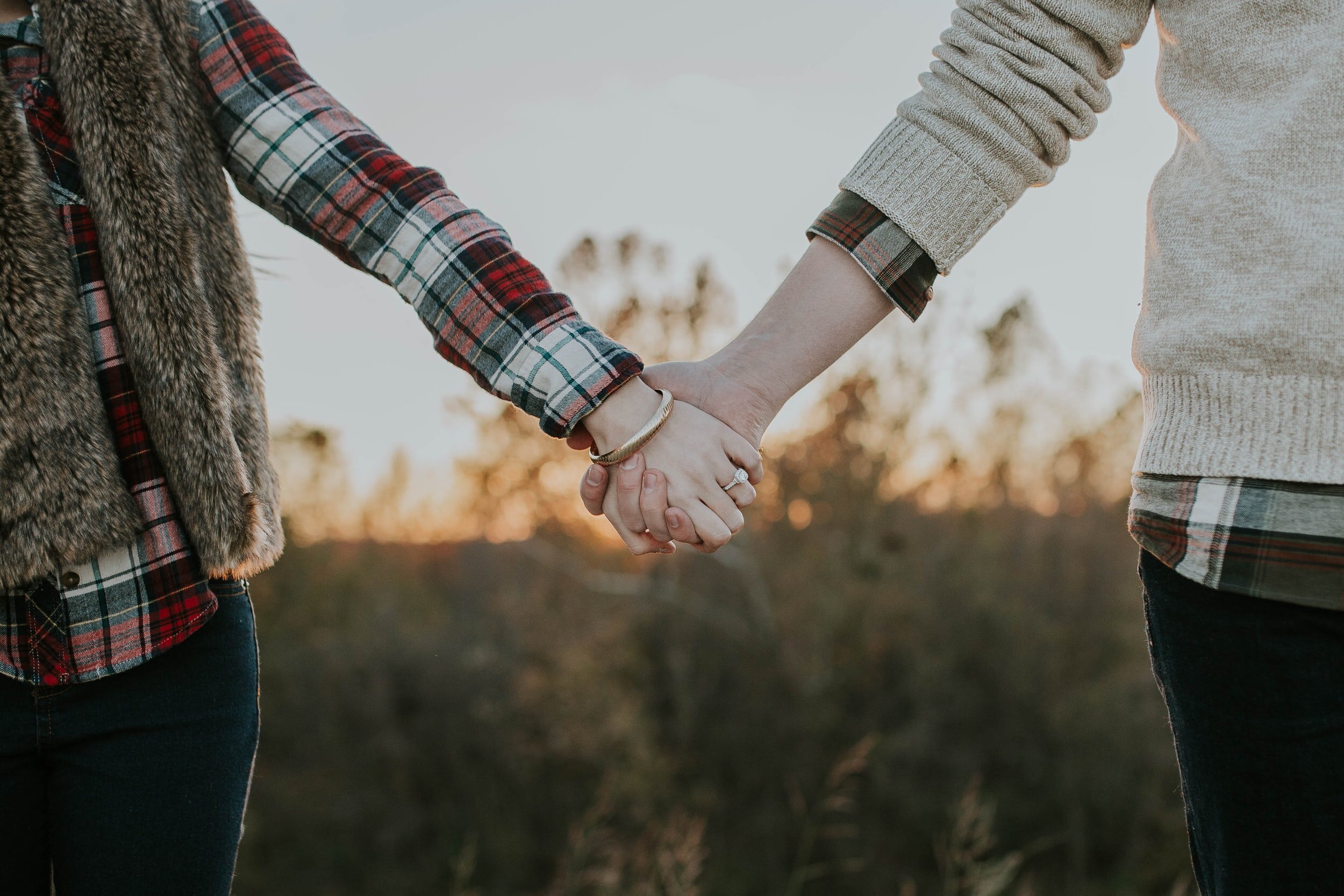Coming out to your wedding suppliers
For same-sex couples, couples with a genderqueer person and trans couples, planning a gorgeous wedding ceremony and reception is much easier in the 21st century than ever before. With Australia wide marriage equality since 2017, couples will find the task of locating LGBTQI friendly wedding vendors more manageable, but reaching out to hire vendors can still be a bit of a stressful process. It shouldn’t be, but it is.
Many queer couples are afraid of flat-out rejection or of booking vendors who might not be a good fit for their community. While there may still be wedding vendors who aren’t supportive of your gender identity or sexual orientation, most may just need a little guidance from you and your partner. In other cases, it might be a good option to “come out” by letting your vendors know before the first appointment that you are a queer couple. Not that you should have to of course. It’s easily done just by using your partner’s first name usually or by saying “he or she” in the conversation somewhere. If you get an “awkie” feel back, then my advice is to move on.
The last thing you want is to be working with a vendor who is only doing it for the money. Sure they are all only doing it for the money…but you’d like to think that there is a fair bit of passion in there too and if they are not completely comfortable with you, then, let’s face it - it’s not going to work. So go with your gut feel.
Here are some instances where it might be beneficial to “come out” to your wedding vendors.
When gender is a big part of the service offering, like a marriage celebrant, photographer or wedding planner
Most marriage celebrants have lots of experience creating wedding ceremonies for straight couples, and the good news here is that if they didn’t wish to officiate at gay ceremonies there was a grace period when same sex marriage was legalised where they could choose to become a “religious celebrant”, which just means that they are not required to officiate gay marriages. So if your marriage celebrant is just a good old “authorised marriage celebrant”, then you should be fine.
Photographers may be very accustomed to posing male-female couples. So look through their online portfolio for some same sex photos. Believe me, if they have them and like doing them, they will demonstrate that on their website. Same goes for the marriage celebrants actually, they will show same sex couples they have married on their website - well I know I do at least anyway and others are crazy if they don’t.
Wedding planners who work with straight couples might not quite be ready for the family dynamics in an LGBTQI relationship, but I would think most of them are.
For wedding vendors who will likely have to change up their offerings to accommodate an LGBTQI wedding, it is wise to let them know your expectations before your initial meeting. This doesn’t have to be a dramatic situation. It can be as simple as adding a line to the end of your initial email briefly stating what you’d like them to know, or it might be as simple as just using your first names if they are gender specific names, or using “him or her”. You can also use something less subtle like, “My partner and I are a lesbian couple getting married next year”. Once again, I know it shouldn't matter, but if it does matter to them, you will soon work it out by the lack of service coming back to you. Plus, this also allows them the opportunity to prepare for your first meeting. If they’ve served queer couples in the past, they can talk through their experience.
When you have specific wording for you, your partner or your relationship
The word “bride” is used a lot when you’re planning a wedding. Genderqueer folks who present as women, not to mention gay couples who will be married without a bride in sight, might need to assert to their wedding vendors how they’d like to be referred. You can use, brides, grooms, partners, whatever you want, but don’t blame them if they use a term you don’t like if you haven’t already let them know.
Guys, just so you know, a group of friends you’ve chosen to be by your side for your groom-groom wedding isn’t a bridal party, it’s a wedding party, or wedding crew or some other name that you use to refer to your gang.
Not to mention trans folks who might be at risk for misgendering. As you’ve probably figured out, wedding vendors are a very courteous bunch and if they’re misgendering you or your partner, or using language that isn’t accurate for your gender, it will probably be as simple as letting them know your preferences to clear things up. Remember, it’s reasonably new territory to them. It’s up to you how detailed you’d like to be, but a simple note via email or at your face-to-face meeting will do the trick. This can apply to your pronouns, your wedding moniker (i.e. do you want to be called a “bride,” “groom,” “fiance” or something else?) or other gendered words.
This is me and the hubby on our wedding day
When you’ll need special venue considerations, like a gender-neutral restroom and duplicate places to get ready
While venues are typically pretty gender-neutral, there can be a few instances when you’ll need to alert them that your LGBTQI wedding will require some different accommodations. Let them know if you’ll need special venue considerations, like a gender-neutral restroom - it should be as easy as changing the sign on the door.
If you’d prefer gender-neutral restrooms for your wedding party and guests, your venue will probably not have a problem accommodating you, but they’ll need a heads up. Up until this point, your gender identity or sexual orientation probably didn’t factor into meeting or booking this wedding vendor, but this is an instance where “coming out” as queer, genderqueer or trans might make things smoother.
If you are working with a wedding planner, it might be less awkward to ask them to have the conversation with the venue. If not, consider shooting off a short email to your venue representative telling them what you’d like and a short explanation. It can be as simple as saying, “We’re wondering if you can make a gender-neutral restroom available for our reception as we and many of our guests identify as genderqueer,” or something to that effect.
Also, have the conversation about where you and your partner will get ready for the wedding, as some places will have a large bridal suite and a smaller suite for grooms. Many groom-groom couples prefer to get ready together, while bride-bride couples may want two bridal suites, both of which need to be large enough for their attendants and glam squad if they’re having one.
Steve Mummery is a celebrant based in Perth
You can find him online at smcelebrant.com.au or facebook at smcelebrant, Instagram @smcelebrant or you can find lots of wedding inspiration on his Pinterest page @smcelebrant including wedding & engagement rings, dresses, shoes, groom's attire, flowers, arbours, the lot.
Call Steve to chat about your wedding ceremony today on 0418 897 215 or email steve@smcelebrant.com.au





